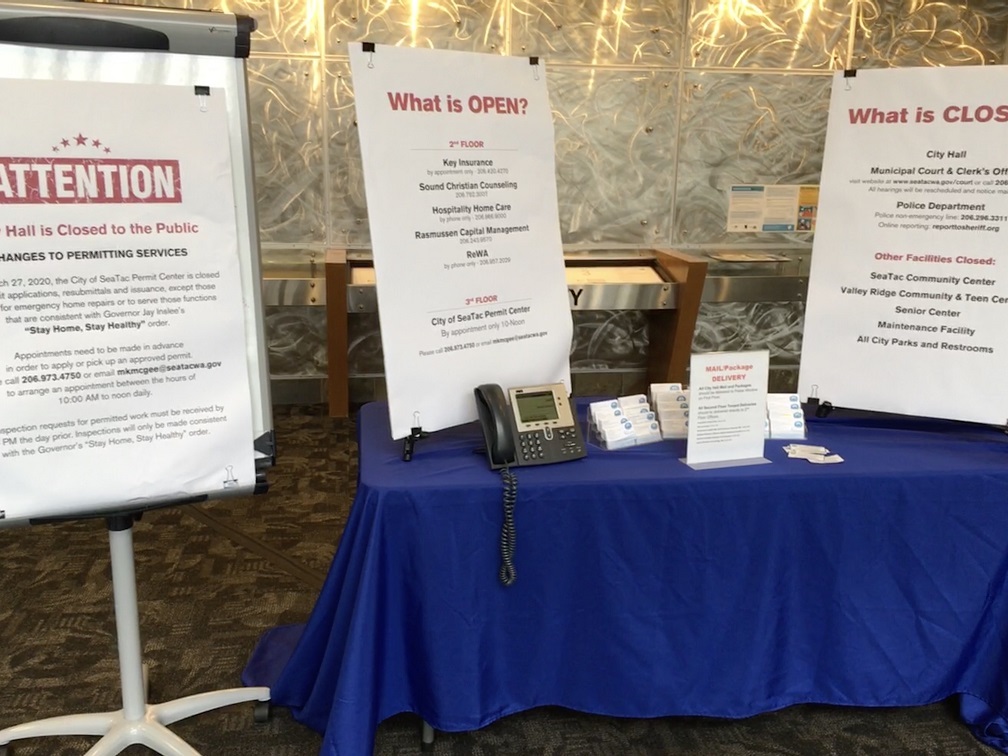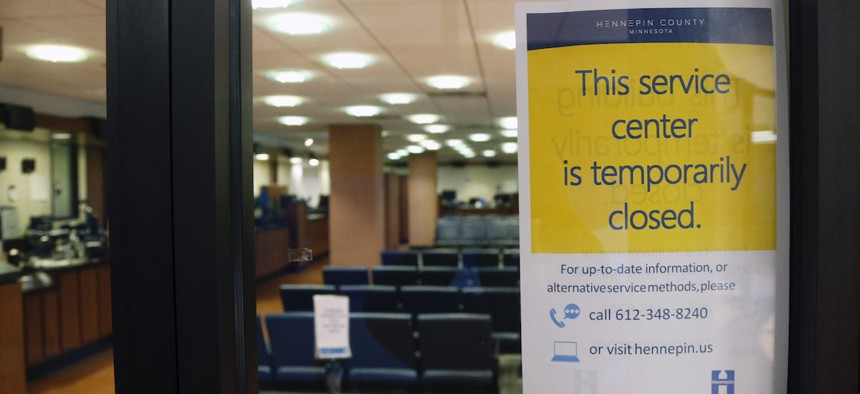Connecting state and local government leaders
As Covid-19 takes hold in communities, local governments are transitioning staff members to telework—a first for many localities. And it's come with challenges, from slow broadband connections to a laptop shortage.
As governments call for business closures, school shutdowns and social distancing among residents, local officials across the country have scrambled to transition their own employees to telework.
The move is necessary to protect residents and government employees and to limit the further spread of coronavirus, officials said. But it’s an unprecedented situation for most municipalities, where public servants deliver dozens of essential services to residents, many of them relying on in-person interactions and on-site work.
“They are definitely moving employees as much as they can to telework,” said Rita Reynolds, chief technology officer for the National Association of Counties, who discussed the issue with a group of nearly 360 county-level IT directors and chief information officers. “Before the height of what we’re dealing with now, counties had begun to assess which employees were already equipped with laptops, which computers needed to be refreshed, and making sure that VPNs [virtual private networks, which allow users to remotely access their government accounts] were set up. The initial response was pretty good. But it’s an ongoing process.”
In both urban and rural areas, officials began that process by determining which government functions could realistically be done remotely. In Douglas County, Nebraska, administrators asked the employees themselves which of their jobs could be performed off-site.
“We basically just did a survey, if you will, of who we thought would be able to provide their service through telecommuting versus those areas in which we needed to have the 24/7 staffing,” said Mary Ann Borgeson, a Douglas County Commissioner and president of NACo. “In places like our long-term care facilities, our corrections, 911, the sheriff’s office—they’re all coming up with a few different models in order to make sure that we have staff that will continually be able to be there. There are some areas that you can’t—you just can’t—telecommute, but we did as many as we could.”
As the pandemic progresses, more and more government offices are closing to the public, Reynolds said, and employees who can’t perform their own jobs remotely are still being sent home to work. The solution, she said, is often a reassignment, typically to long-term projects that were previously shelved in favor of more urgent day-to-day functions.
“The idea is to give them a job to do even though they can’t be in the office,” she said. “For example, many counties have a backlog when it comes to archiving and digitizing documents, so they’ll give employees a laptop and a scanner so they can start doing that work from home.”
At the Health Services Agency in Santa Cruz County, California, employees have worked together to allow the most at-risk workers to tackle tasks that can be performed remotely, said Mimi Hall, the department’s director.
“Because we did this early, we did find that there were employees who had less ability to work from home, but still wanted to work, so they’ve been assigned to do other things,” she said. “We have a call center set up, a question-and-answer line for community members and other folks, and we have rounded some of that out with those staff. We have also authorized alternative schedules, overtime and on-call, because some of our divisions are working seven days a week in different shifts. Others that have less demand have moved online.”
Places that modernized ahead of time have generally had an easier time making the transition. In SeaTac, Washington, city officials began transitioning staff members to laptops three years ago. That, plus existing VPN access and video-conferencing software, made it easy for workers to begin telecommuting, said Peter Kwon, the city’s deputy mayor.
“The investment into technology was not specifically to prepare for an emergency,” he said. “We wanted to conserve resources and reduce paperwork by moving to online storage, and also to improve community participation and engagement by providing live video streaming of meetings. All of that has helped us, but the plan was not to do this in case of an emergency—it was because we wanted to be more modern.”

The advance procurement of laptops is especially important, officials said, as they’re hard to come by now that more Americans are working from home.
“We had made orders from several companies before our shelter-in-place order and before this was really an issue, and those shipments sort of disappeared as soon as everyone else got involved,” said Sybil Gurney, assistant chief information officer for Alameda County, California. “We’ve had difficulty getting equipment, and that’s been tough.”
In Chippewa County, Minnesota, officials have dealt with the laptop shortage by outfitting desktop computers with VPN software so employees can use them at home. Once that’s done, about half of the county’s 150 employees will be working remotely, said Terry Ocaña, the county’s IT director.
“We don’t have enough technology to send everyone home, but some people need to stay in the office,” he said. “Those would be our county property assessors and property tax workers, and people who have been seeing citizens by appointment for essential things like death certificates or marriage licenses.”
Morale has remained fairly high, Ocaña said, bolstered partly by the unprecedented decision to allow employees to work from home using desktop computers that would normally be required to stay in the office. But there have been challenges, including a lack of consistent access to quality broadband for employees who reside in rural parts of the county.
“I think the nation as a whole is going to have to reevaluate what our broadband standards are,” he said. “The minimum standards may work when the system is being taxed at an average rate, but not when you have schools trying to distance-learn with video and you have half or better of your workforce trying to work from home. We are having a lot of workers experiencing real difficulties in being able to keep a consistent internet connection in order to work from home.”
Remote working arrangements can also leave government networks susceptible to outside attacks, Reynolds said. Employees may accidentally connect outside of the secure VPN, leaving sensitive files vulnerable to hackers with no IT personnel on hand to immediately detect the breach.
“With the increase in telework and remote connectivity, two areas of importance are at the forefront. The first is ensuring that employees understand cybersecurity is even more important as they telework. This includes using secure connections such as VPN, which many may not be familiar with,” she said. “The second relates to broadband access. Many counties have staff that live in rural areas where their internet access is slow and unreliable. This is especially evident when more secure connections like VPN have to be used. While county IT can address the former, it’s the latter that county IT has little control over.”
Amid the struggles, some governments have seen positives. SeaTac employees report higher levels of productivity now that their morning commutes have been eliminated, Kwon said. Most officials are confident that their governments can function remotely through the duration of the pandemic. But there will need to be conversations after about what worked well and what needs attention, Ocaña said.
“The situation is fluid and it’s hard to stay in front of it, but more importantly than getting through the crisis, which we’re all eventually going to do, is figuring out what lessons we’re going to take out of this,” he said. “This situation is highlighting the digital disparity between small rural counties and large metro counties, and I think some of that is culture, not just a lack of technology. In a small community, people may like to communicate face to face versus digitally, and I think we need to be better at equipping our users and training them for future business tactics. When this is over, we’re going to need to ask what we can change, not just to better respond to the next crisis, but to change our business as usual.”

NEXT STORY: Is America Ready for a Second Wave of Coronavirus?



